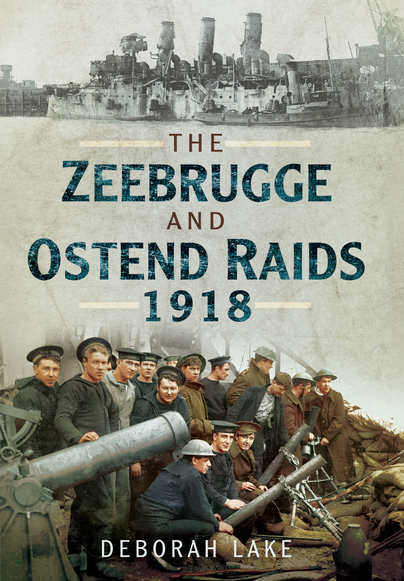The Zeebrugge & Ostend Raids 1918 (Paperback)
Imprint: Pen & Sword Military
Pages: 208
ISBN: 9781473837966
Published: 2nd June 2015
(click here for international delivery rates)
Need a currency converter? Check XE.com for live rates
| Other formats available | Price |
|---|---|
| The Zeebrugge & Ostend Raids 1918 ePub (3.1 MB) Add to Basket | £6.99 |
The Zeebrugge Raid is one of the most exciting small actions, not just of the First World War but in British history. The purpose was to counter the U-boat menace. Submarine attacks on Allied shipping caused great difficulty. The Admiralty claimed that the war would be lost unless the submarine attacks were curtailed.
Admiral Keyes proposed blocking the ports. At Zeebrugge, a diversionary landing on the Mole - an enormous breakwater - would divert attention from the blockships as they entered the harbour. The defences were extremely strong. Surprise and daring were essential. Despite over 600 casualties, the attacks were a great boost to civilian morale in Britain. Eleven Victoria Crosses were awarded, eight of them for the Zeebrugge raid alone. Some recipients were chosen by the survivors, one of the very few times this has been done.
NOTE: reviewed alongside The Raid on Zeebrugge: 23 April 1918, as seen through the eyes of Captain Alfred Carpenter, VC
Warship 2017, reviewed by Phil Russell
These two books take very different approaches.
Deborah Lake draws on in-depth research to give a clear narrative of the build-up, planning and execution of the raids – although detailed references are lacking and only a range of secondary sources are listed in the bibliography.
Her book celebrates the achievements and heroic
deeds of the raiders in a very readable if somewhat ‘Boy’s Own’ style.
The books work well together, providing contrasting accounts of events, and when read jointly give a comprehensive understanding of this ambitious and heroic venture.
During the spring of 1918, the Allies’ situation was grim. Resources were dwindling, the German Spring Offensive was causing concern and their U-Boat menace was threatening. The Admiralty claimed that the war would be lost unless the German submarine attacks were curtailed. The enemy bases at Zeebrugge and Ostend thus became prime targets for attack – an ambitious plan was hastily proposed to block the ports, and to include a diversionary landing at Zeebrugge to maximise the possibility of surprise. In all 600 casualties were caused among the attacking force and the ferocity of the fighting is testified by the subsequent award of eight Victoria Crosses at Zeebrugge and three at Ostend. In this republished paperback edition, the author draws on hitherto unpublished material from both Allied and German sources. There are 29 monochrome illustrations, a bibliography and an index.
Stuart Asquith, Author
Deborah Lake skilfully outlines the tactical and strategic situation and the political context to the raids and reveals the woeful lack of planning and preparation, or rather she shows that planning and preparation were based on making the situation fit the capabilities of the assaulting force.
Australian Naval Institute - John Johnston
Lake is particularly critical of Vice-Admiral Sir Roger Keyes for the intriguing through which he secured command of the patrol and for his failure to exercise command during the preparations for the raid. Staff work was minimal, orders were unclear, and intelligence was lacking and the results were inadequately trained landing parties, ineffective equipment, and vessels in the wrong positions.
Lake’s analysis of these failures is especially devastating because of her background as an RAF staff officer working in Whitehall, but that experience enables her to understand and to describe the interplay of personalities and politics, of differing strategies between services and within a service. She thus illuminates the story of the raids from an angle that documented research or management analysis could not provide, and the lessons which she draws neatly but sotto voce are ones military staffs would do well to heed.
Lake’s other strength is the blow-by-blow accounts she has collated from British, German, and Belgian sources and so each moment of action in the raids is captured. Her book thus complements the collection of slides that form the book by Carl Decaluwé and Tomas Termote
In the Spring of 1918, the situation in World War One for the Allies was very bleak. Resources were scarce, with Russia out the War, the German Spring Offensive posed a huge threat, and the U-Boat fleets took a heavy toll on Britain’s shipping. The Admiralty believed that the Allies would lose the war unless the U-boat attacks could be curtailed. Hence, the attack on the German bases of Zeebrugge and Ostend.
Destructive Music
The fighting was ferocious, with the attacking force taking 600 casualties and eleven Victoria Crosses were awarded between the two raids. It was a major propaganda coup for the Allies, but there was more to it than that, the planning of the attacks was far from flawless, and over time it became hard to separate fact from fiction.
With her superb research, former RAF pilot Deborah Lake, has managed to shed a great deal of light on the planning and execution of the raids. As a good researcher should, she has drawn from German sources in order to get both sides of the story.
A fine book, written in an engaging style, and one that deserves to be far better known, as does its subject matter.















